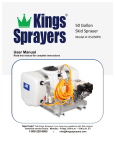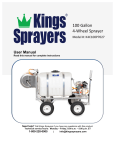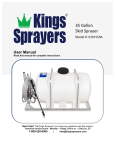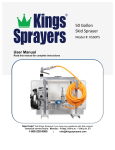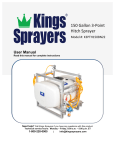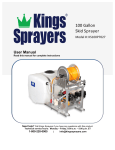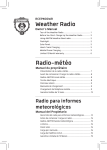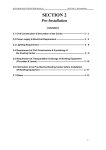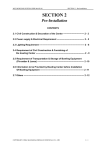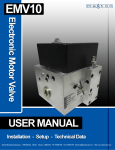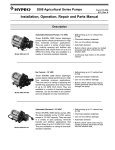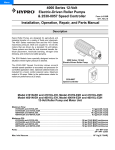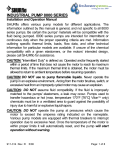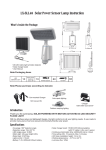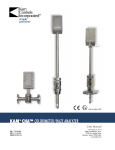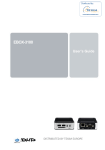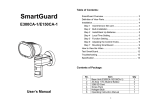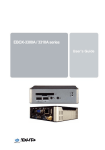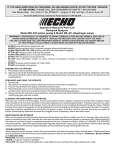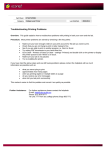Download 150 Gallon 3-‐Point Hitch Sprayer
Transcript
150 Gallon 3-‐Point Hitch Sprayer Model #: K3PTH150B12 User Manual Read this manual for complete instructions Need help? Call Kings Sprayers if you have any questions with this product. Technical service hours: Monday – Friday, 8:00 a.m. – 5:00 p.m. ET 1-800-228-0905 | [email protected] Model #: K3PTH150B12 Table of Contents Warranty .......................................................................................................................... 3 General Safety Information ........................................................................................... 3 Hazardous Substance Alert .......................................................................................... 4 Sprayer Components ..................................................................................................... 5 Getting Started ............................................................................................................... 7 Starting Your 3-Point Hitch Sprayer for the First Time ....................................................... 7 Shutting Down Your 3-Point Hitch Sprayer .......................................................................... 7 Troubleshooting Your Sprayer ..................................................................................... 8 2 Warranty 5 year frame / 5 year tank / 1 year parts and labor (limited to manufacturer defects) / 1 year pump (limited to manufacturer defects). The warranty will not apply to products that were improperly installed, misapplied, damaged, altered or incompatible with fluids or components. Kings Sprayers obligation under this warranty is limited to the repair or replacement of the product. All returns will be tested per factory criteria. Products found not defective (under the terms of this warranty) are subject to charges paid by the returnee for testing and packing of “tested good” non-warranty returns. No credit or labor allowances will be given for products returned as defective. Warranty replacement will be shipped at Kings Sprayers discretion. Kings Sprayers reserves the right to choose the method of transportation. Contact Kings Sprayers at 800-228-0905 to receive a Return Merchandise Authorization (RMA#) before returning any products. The RMA number should be clearly marked on the outside of the package. Kings Sprayers shall not be liable for freight damage incurred during shipping. All products returned for warranty work should be sent shipping charges prepaid. General Safety Information Roller pumps are intended for creating or booting dynamic pressure and depending on the type of body, rotor and rollers used, will work with a variety of fluids. These pumps will work in a variety of environments but they should never be used to pump liquids above 140°F (60°C) or below 34°F (1°C), or when ambient air temperature is above 140°F (60°C). Any uses outside of those specified in the pump manual are considered misuses and are prohibited. Only use approved chemicals in your pump. Contact Kings Sprayers with any questions regarding specific acceptable uses. The following chemicals should never be put through any pump: • • • • • • • Gasoline (Petrol) Kerosene/Kerosine (Paraffin) Diesel Fuel Ceramic Slurries Sewage Potable Water Abrasive Fluids Roller pumps are designed to operate effectively within the specified speed, pressure and environmental ranges. Going outside of these ranges will void the warranty and could cause damage to property, serious injury or death. DO NOT run the pump faster than the maximum recommended speed DO NOT run the pump higher than the maximum recommended pressure DO NOT run pumps when the liquid, or ambient air, has exceed the maximum or minimum temperature limit DO NOT pump non-approved liquids (See Below) DO NOT pump water or other liquids for human consumption DO NOT operate any roller pump under the influence of drugs or alcohol DO NOT run the pump dry DO NOT pump abrasive fluids 3 DO NOT perform service or maintenance to the pump or attached components until the pumping unit is below 109°F Only authorized operators having the knowledge and skill necessary to safely use the pump, or any equipment the pump is connected to, may run the pump. When running roller pumps, it is essential that operators use hearing protection as the sound levels reach levels of 80 decibels. When handling pumps, wear steel-toed shoes and protective gloves in order to protect the feet in the event the pump is dropped and protect the hands from chemicals or any sharp surfaces on the pump. When spraying manually, chemical-resistant facemasks and clothing should be worn to prevent any chemicals from coming into contact with the skin or being inhaled. When spraying manually, always spray downwind of yourself as long as the sprayed chemical will not drift into the vicinity of other people. When installing, adjusting or removing a roller pump, ensure that there are no objects which can fall on the installer, and make certain that all machinery to which the pump is to be attached is turned off. Never operate a roller pump outside while there is a chance of getting struck by lightning. Never leave wires or plumbing components where they can be a tripping hazard or become entangled in a moving component. Roller pumps should not be used if the ambient light is below 200lux. All maintenance should be done when machinery is stationary and has been isolated from its energy sources. It is dangerous to perform maintenance while machinery is still connected to its power source. Machinery should be isolated from its electrical, hydraulic, shaft driven or gas engine power source. Be sure to release all pressure from the system before performing any sort of maintenance on a roller pump. Hazardous Substance Alert Any hazardous liquids should be disposed of in a manner that complies with local and national regulations. Never dump fluids onto the ground. Always drain and flush pump before servicing or disassembling for any reason. Always drain and flush pumps prior to returning unit for repair. Never store pumps containing hazardous chemicals. Before returning pump for service/repair, drain out all liquids and flush unit with neutralizing liquid. Then, drain the pump. Attach tag or include written notice certifying that this has been done. Please note that it is illegal to ship or transport any hazardous chemicals without United States Environmental Protection Agency Licensing. 4 Sprayer Components Figure 1: Front View Unobstructed bypass line Inline strainer to keep debris out of system On/Off Ball valve for agitation Ball valve shut off flow when cleaning strainer or servicing system Category 1 Pin (Category 2 and 3 available) PTO quick coupler Regulator – Screw In/Out to adjust pressure (“in” to increase, “out” to decrease) Nut to lock pressure setting Pressure gauge to calibrate when spraying Boom selector valve -‐ Choose from seven (7) different settings to control which boom sections are spraying. Flip handle up (towards you) to engage valve. Figure 2: Detailed View 5 Quick disconnect spray gun High pressure hose (50’) Left arm Figure 3: Back View (Booms Down) Center arm Right arm 6 Getting Started Starting Your 3-‐Point Hitch Sprayer for the First Time 1. 2. 3. 4. 5. 6. 7. 8. 9. Ensure all unnecessary personnel are clear of the area. For initial testing, it is recommended to start with clean water instead of chemicals to confirm the system and plumbing components are leak free. Ensure there is fluid in the tank and supply line. DO NOT run dry. Check line strainer for debris or clogs and remove if any found. Check all plumbing connections to ensure tightness. Check PTO connection and ensure sprayer is properly mounted to tractor. Ensure all valves and regulators are set to the desired setting and working properly. Ensure all hoses are positioned properly and undamaged. Start PTO. If possible, slowly increase the RPM until the desired flow or pressure is reached. DO NOT let pump exceed it’s maximum pressure or flow. Shutting Down Your 3-‐Point Hitch Sprayer 1. 2. 3. Slowly decrease RPM until the pump comes to a stop. Close all valves in the system. If pump will not be used for several hours, flush your system to prolong the life of the components. For a step-by-step video guide, visit the Sprayer Depot YouTube Channel to watch instructional videos on a variety of topics. Tune in by visiting http://YouTube.com/SprayerDepot. 7 Troubleshooting Your Sprayer Symptom Pump does not prime Possible Reason Leak in suction line Obstruction in suction line Suction hose sucked to bottom side of tank Rollers stuck in pump Loss of pressure Pump seals leaking air Pump turning in wrong direction Clogged suction strainer Kinked or blocked suction hose Air leak in inlet side plumbing Pump will not turn Relief valve setting too low or weakened spring Faulty gauge Pump seals leak air Nozzle orifices worn Pump worn Corrosion (rust), scale or residue Solid object lodged in pump Correction Check hose and fittings for leaks and correct Inspect hose for obstructions such as debris or loose inner liner and remove from the line Cut a notch or “V” in end of suction hose Disassemble pump and inspect rollers Replace seals Correct rotation of pump Check strainer and clean regularly Inspect suction hose and repair as necessary Check hose and connections for leaks. Use pipe joint sealant and retighten connections Check relief valve and correct setting or replace spring Replace gauge Replace seals Replace nozzles Repair pump Replace pump Disassemble pump and remove objects 8








